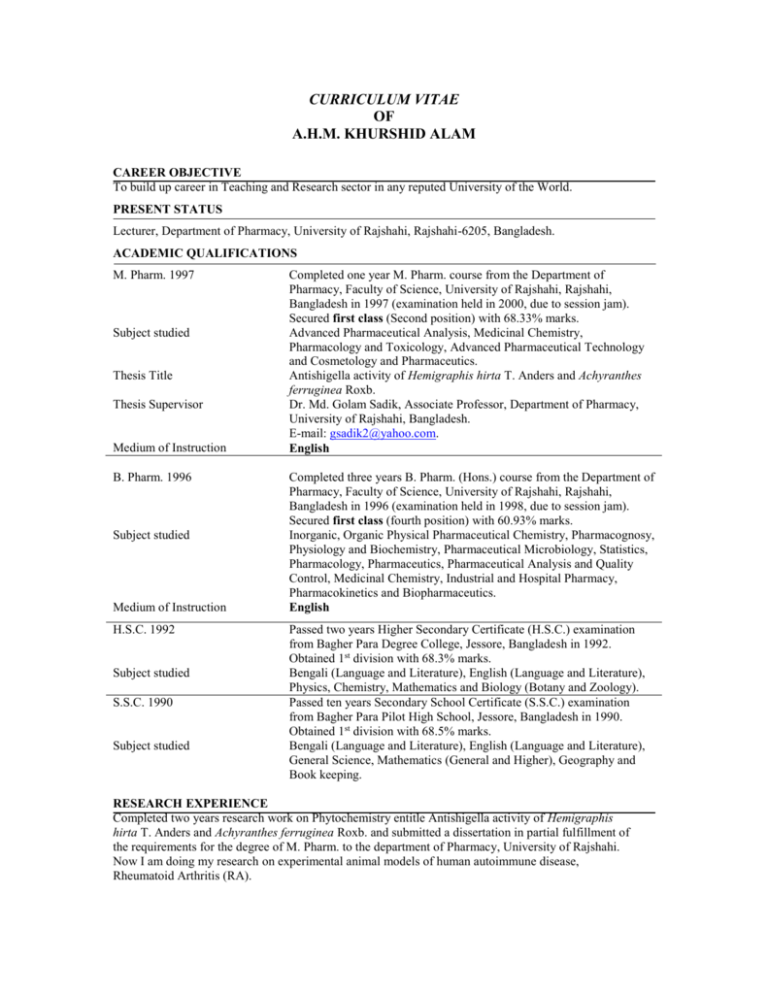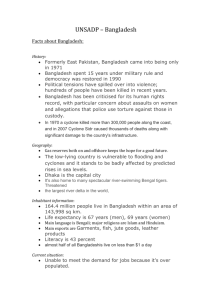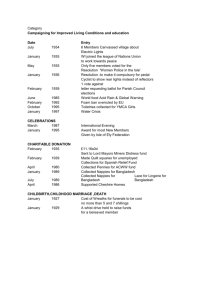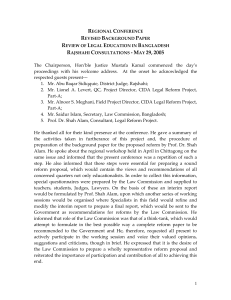CURRICULUM VITAE
advertisement

CURRICULUM VITAE OF A.H.M. KHURSHID ALAM CAREER OBJECTIVE To build up career in Teaching and Research sector in any reputed University of the World. PRESENT STATUS Lecturer, Department of Pharmacy, University of Rajshahi, Rajshahi-6205, Bangladesh. ACADEMIC QUALIFICATIONS M. Pharm. 1997 Subject studied Thesis Title Thesis Supervisor Medium of Instruction B. Pharm. 1996 Subject studied Medium of Instruction H.S.C. 1992 Subject studied S.S.C. 1990 Subject studied Completed one year M. Pharm. course from the Department of Pharmacy, Faculty of Science, University of Rajshahi, Rajshahi, Bangladesh in 1997 (examination held in 2000, due to session jam). Secured first class (Second position) with 68.33% marks. Advanced Pharmaceutical Analysis, Medicinal Chemistry, Pharmacology and Toxicology, Advanced Pharmaceutical Technology and Cosmetology and Pharmaceutics. Antishigella activity of Hemigraphis hirta T. Anders and Achyranthes ferruginea Roxb. Dr. Md. Golam Sadik, Associate Professor, Department of Pharmacy, University of Rajshahi, Bangladesh. E-mail: gsadik2@yahoo.com. English Completed three years B. Pharm. (Hons.) course from the Department of Pharmacy, Faculty of Science, University of Rajshahi, Rajshahi, Bangladesh in 1996 (examination held in 1998, due to session jam). Secured first class (fourth position) with 60.93% marks. Inorganic, Organic Physical Pharmaceutical Chemistry, Pharmacognosy, Physiology and Biochemistry, Pharmaceutical Microbiology, Statistics, Pharmacology, Pharmaceutics, Pharmaceutical Analysis and Quality Control, Medicinal Chemistry, Industrial and Hospital Pharmacy, Pharmacokinetics and Biopharmaceutics. English Passed two years Higher Secondary Certificate (H.S.C.) examination from Bagher Para Degree College, Jessore, Bangladesh in 1992. Obtained 1st division with 68.3% marks. Bengali (Language and Literature), English (Language and Literature), Physics, Chemistry, Mathematics and Biology (Botany and Zoology). Passed ten years Secondary School Certificate (S.S.C.) examination from Bagher Para Pilot High School, Jessore, Bangladesh in 1990. Obtained 1st division with 68.5% marks. Bengali (Language and Literature), English (Language and Literature), General Science, Mathematics (General and Higher), Geography and Book keeping. RESEARCH EXPERIENCE Completed two years research work on Phytochemistry entitle Antishigella activity of Hemigraphis hirta T. Anders and Achyranthes ferruginea Roxb. and submitted a dissertation in partial fulfillment of the requirements for the degree of M. Pharm. to the department of Pharmacy, University of Rajshahi. Now I am doing my research on experimental animal models of human autoimmune disease, Rheumatoid Arthritis (RA). WORK DONE ON THE RESEARCH PERIOD 1. Extraction of whole plants of Hemigraphis hirta T. Anders and Achyranthes ferruginea Roxb. by rectified spirit with the help of hot and cold extraction methods respectively. 2. Fractionation of the crude extract using petroleum ether, chloroform, ethyl acetate and methanol. 3. Isolation and purification of compounds using column chromatography, TLC, PTLC 4. Structure elucidation of the isolated compounds with the help of UV, IR, NMR and Mass Spectroscopy. 5. Observation of in vitro antishigella and other antimicrobial activity of crude extracts, fractions and pure compounds with standard one using disc diffusion assay method. 6. Determination of Minimum Inhibitory Concentration (MIC) of pure compounds and fractions. 7. Brine shrimp lethality bioassay and determination of LC50 value of various fractions and pure compounds. 8. Observation of subacute toxicity of pure compounds and crude extract in rat. ACHIEVEMENT OF RESEARCH Four compounds were isolated, of which one is N-trans-feruloyl-4-methyl dopamine isolated from Achyranthes ferruginea. Although the compound N-trans-feruloyl-4-methyl dopamine is a known natural product but this is the first report of its occurrence from the Amaranthaceae family and second report from the plant source. The remaining three compounds were known, designated as squalene, lupeol and -sitosterol- -D-glucoside. The compound, N-trans-feruloyl-4-methyldopamine showed good antibacterial activity. Biochemical parameters showed normal on subacute studies on rats with the compounds and fractions. TRAINING OBTAINED Two weeks in-plant training in “Square Pharmaceutical Limited” a leading chemical and pharmaceutical industry in Bangladesh. During this period I observed manufacturing as well as quality control operation of tablets, capsules, liquid and sterile preparations. LIST OF PUBLICATIONS INTERNATIONAL PUBLICATIONS 1. Yamaki, K, Alam, AHMK, Hossain, MA, Taneda, S, Yanagisawa, R, Takano, H and Yoshino, S. Effect of Rolipram, a Phosphodiesterase IV Inhibitor, on Allergic Footpad Swelling using Various Adjuvants in Mice. Scand. J. Immunol. 2005, 62(4): 378-84. Abstract: We studied the effect of rolipram, a phosphodiesterase (PDE) IV inhibitor, on allergic footpad swelling in mice. For this study, varying adjuvants including complete Freund's adjuvant (CFA), incomplete Freund's adjuvant (IFA) and Imject Alum (Alum) were used because the extent of antigenspecifically induced T helper type 1 (Th1) and Th2 responses had been shown to depend on adjuvants used. To induce allergic footpad swelling, we immunized mice with ovalbumin (OVA) emulsified in either CFA or IFA, dissolved in Alum or in phosphate-buffered saline (PBS) as a control (day 0), followed by subcutaneous injection of the antigen into footpads on day 21. Rolipram was given orally to the animals daily from days 0-20. Results showed that treatment with rolipram was followed by an increase in early swelling at 0.5 h and a decrease in late swelling at 6 and 24 h in the CFA group. In the IFA group, rolipram significantly enhanced swelling at, but not after, 30 min. In the Alum and the PBS groups, the PDE inhibitor failed to affect the OVA-specific footpad reaction at all times examined. Treatment of the CFA and IFA groups with rolipram significantly inhibited the production of the Th1 antibody anti-OVA immunoglobulin G2a (IgG2a), and the drug enhanced Th2 cell-dependent anti-OVA IgE production. In both groups, rolipram also enhanced the secretion of Th2 cytokines including interleukin-4 (IL-4) and IL10. These findings suggest that rolipram may facilitate early allergic footpad swelling mediated by Th2 immune responses, while the late phase of swelling associated with Th1 responses may be attenuated by the PDEIVinhibitor. 2. Rahman, M.M., Lopa, S.S., Sadik,G., , Rashid, M.H., Islam, R., Khondkar, P., Alam, A.H.M.K and Rashid, M. A. Antimicrobial and cytotoxic compounds from the bark of Cananga odorata. Fitoterapia; 2005, 76:758-761. Abstract: O-methylmoschatoline, liriodenine and 3,4-dihydroxybenzoic acid isolated from the barks of Cananga odorata showed significant antibacterial activities against a number of Gram (+) and Gram (-) bacteria. 3. Salam, K.A., Hossain, A.K.M.M., Alam, A.H.M.K., Pervin, F. and Absar, N.A. Comparative Analysis on Physico-chemical Characteristics of Oil Extracted from Six Different Parts of Hilsa fish (Hilsa ilisha). Pakistan Journal of Biological Sciences, 2005, 8(6): 810-815. Abstract: The physico-chemical characteristics of oils extracted from six different parts of hilsa fish (Hilsa ilisha) like dorsal, ventral, tail, egg, liver and brain were analyzed. The physical characteristics such as the specific gravity, refractive index, smoke point, flash point, fire point, cloud point, solidification point and pour point of the hilsa fish oils from the different parts presently examined were ranged from 0.920 to 0.932, 1.4700 to 1.4722 at 25, 220 to 228 0C, 322 to 3300C, 350 to 3640C, 2 to 2.40C, -10 to -50C and -7 to 60C, respectively. The chemical properties such as saponification value, iodine value, peroxide value, acid value, % FFA and unsaponifiable matters of the hilsa fish oils from different parts were found to be varied from 180.28 to 194.00, 80.70 to 126.40, 7 to 10, 4.16 to 12.00, 2.08 to 6.00 and 1.58% to 7.00%, respectively. The saturated and unsaturated fatty acids present in the oil samples were mainly myristic acid (5.44 to 7.24%), palmitic acid (22.00 to 27.08%), stearic acid (4.00 to 6.32%), palmitolenic acid (12 to 14%), oleic acid (26.08 to 29.78%), linoleic acid (0.92 to 2.20%) and linolenic acid (0.82 to 1.08%). The storage effect on the hilsa fish oils, which were obtained from different parts for the production of fatty acids by the action of lipase have been studied after storing the samples at low temperature (-100C- 00C) and at room temperature (25-280C). The contents of % FFA were initially low but increased rapidly on storage. It has been shown that lipase enzyme in hilsa fish oil is active even at temperature -100C. The hydrolytic deterioration of hilsa fish oils were found to be more effective at 00C than that from -100C. Further, the qualities of hilsa fish oils were deteriorated slightly further when stored at 25 0C. 4. Baki, M.A., Akhtar, N., Rahman, M.M., Islam, M.N., Hossain, M., Islam, N., Alam, A.H.M.K., Islam, R., Khatun, N.A. and Mondal, K.A.M.S.H. Synergistic action of Wedelia calendulaceae Less. plant extracts with lamda cyhalothrin on adult red flour bettle Tribolium castaneum herbst. Journal of Agronomy; 2005, 4 (1): 18-25. Abstract: Synergistic action of Wedelia calendulaceae Less. plant extracts combined with Lamda cyhalothrin were demonstrated against red flour bettle T castaneu in methanol extract W calendulaceae plant extracts offered Synergistic action when used Lamda cyhalothrin. It was noted that plant extract indicates synergistic action from 1:1 to 1:5 ratio and above. 5. Yamaki, K., Li, X., Uchida, H., Alam, A.H.M.K., Hossain, M.A., Yanagisawa, R., Takano, H., Hayashi, H., Mori, Y. and Yoshino, S. Effects of the phosphodiesterase IV inhibitor rolipram on Th1 and Th2 immune responses in mice. Journal of Pharmacy and Pharmacology; 2004, 56: 877-882. Abstract: The present study was designed to investigate the effect of the phosphodiesterase (PDE) IV inhibitor rolipram on Th1 and Th2 immune responses in mice. Mice were immunized subcutaneously at the base of the tail with ovalbumin (OVA) emulsified with complete Freund's adjuvant (day 0) and were treated daily with oral administration of various doses of rolipram from days 0 to 20. On day 21, production of anti-OVA IgG and proliferative responses to the antigen were determined. Anti-OVA IgG2a and interferon- (IFN-) as indicators of Th1 responses and anti-OVA IgG1 and interleukin-10 (IL-10), as indicators of Th2 responses, were also measured. The results showed that treatment with rolipram failed to affect the production of OVA-specific IgG but decreased the proliferation of spleen cells to the antigen. Its inhibitory effect on these immune responses was correlated with a marked decrease in IFN- and but not IL-10 production, although neither anti-OVA IgG2a nor IgG1 production was affected by rolipram. These results suggest that rolipram may preferentially inhibit Th1 responses more effectively than Th2 responses. Administration of rolipram resulted in suppression of antigen (OVA)-induced arthritis in mice. The suppression of joint inflammation by rolipram was associated with the inhibition of OVA-specific proliferative responses of spleen cells and IFN- secretion. These results indicate that rolipram may be effective in regulating Th1 mediated diseases such as rheumatoid arthritis. 6. Islam, R., Alam, A.H.M.K., Hossain, M.A., Mosaddik, M.A. and Sadik, G. Biological screening of Bangladeshi mango mistletoe (Loranthus globosus Roxb.) bark extracts. Fitoterapia 2004, 75: 405-408. Abstract: The ethyl acetate extract of the Bangladeshi mango mistletoe (Loranthus globosus Roxb.) bark was found to be most effective against both gram positive and gram-negative bacteria and it also showed good cytotoxicity with a LC50 10.83 g/ml. 7. Hossain, M.S., Hossain, A., Islam, R., Alam, A.H.M.K., Zahan, K., Sarkar, S. and Farooque, M.A. Antimicrobial and cytotoxic activities of 2- aminobenzoic acid and 2-aminophenol and their coordination complexes with Magnesium (Mg-II). Pakistan Journal of Biological Sciences; 2004, 7 (1): 25-27. Abstract: Owing to the biological importance of metalloelements in many biological processes, especially metabolic processes, magnesium (Mg-II) complexes were synthesized and examined for their antimicrobial and cytotoxic activities. Among the two synthesized organometalic complexes [Mg (2-ap)2, A] and [Mg (2ab)2, C], the maximum antibacterial and antifungal activities were shown by the compound A. Among the ligands, 2-aminophenol (B) showed more antibacterial activity than 2- aminobenzoic acid (D). The minimum inhibitory concentration for the complex A against five pathogenic bacteria Streptococcus-haemolyticus, Bacillus subtilis, Staphylococcus aureus, Salmonella typhi and Escherichia coli were found in the range of 32-64 g ml-1. The complexes were also tested for their cytotoxicity using brine shrimp lethality bioassay method and the LC50 values of the complexes A and C were found to be 5.7 and 24.3 g ml-1, respectively. Antibacterial, antifungal and cytotoxic studies undertaken for the above compounds indicated structure-activity relationships. These metalloderivatives were more active than the parent compounds (ligands). 8. Alam, A.H.M.K., Sadik, G., Rashid, M.H., Hasan, C.M. and Rashid, M.A. N-trans-feruloyl-4methyldopamine from Achyranthes ferruginea. Biochemical Systematics and Ecology; 2003, 31(11): 134546. Abstract: N-trans-feruloyl-4-methyldopamine was isolated from Achyranthes ferruginea as a new source. This compound has got chemotaxonomic significance in the family Amaranthaceae. 9. Alam, A.H.M.K., Rahman, M.A.A., Baki, M.A., Rashid, M.H., and Sadik, G. Chemical constituents of Hemigraphis hirta T. Anders (Acanthaceae). Pakistan Journal of Biological Sciences; 2002, 5(11): 12641266. Abstract: Phytochemical examination of the petroleum ether extract of Hemigraphis hirta has led to the isolation of squalene (1), lupeol (2) and -sitosterol (3) by a combination of column and preparative thin layer chromatography. The structures of these compounds were determined by spectroscopic analysis (UV, IR, 1H-NMR, 13C-NMR) as well as by comparison of their spectral data with previously reported values. 10. Sadik, G., Gafur, M.A., Bhuiyan, M.S.A., Alam, A.H.M.K., Biswas, M.H.U., Hasan, P., Mannan, A.M, Khan, M.O.F. and Chowdhury, A.K.A. Antifertility Activity of Pergularia daemia. The sciencess; 2001, 1 (1): 22-24. Abstract: The ethanolic extract of Pergularia daemia and its steroidal fraction were studied for antifertility activity. Both the ethanol extract and the steroidal fraction showed significant antifertility activity in the pre-implantation stage in female mice. The ethanol extract also showed late abortifacient activity. 11. Alam, A.H.M.K., Islam, R, Salam, K.A., Baki, M.A., Manir, M., Hossain A, and Sadik, G. Toxicological studies of N-trans-feruloyl-4-methyldopamine isolated from Achyranthes ferruginea. Pakistan Journal of Biological Sciences (In-press). Abstract: The subacute toxicity of a metabolite N-trans-feruloyl-4-methyldopamine isolated from Achyranthes ferruginea (Amaranthaceae) was studied on long Evan’s rats. The studies include the gross observation such as changes in body weight, haematological profiles [total count of red blood cells (RBC) and white blood cell (WBC), differential count of WBC, platelet count and haemoglobin (Hb) %], biochemical parameters of blood [serum glutamate oxaloacetate transaminase (SGOT), serum glutamate pyruvate transaminase (SGPT), serum alkaline phosphatase, urea and creatinine] and histopathology of the liver, kidney, heart and lung of both control and experimental groups of rats. The changes of haematological and biochemical parameters were statistically not significant after the administration of metabolite in a dose of 300 g/rat/day for consecutive 14 days. No abnormalities were also found in the histopathology of the liver, kidney, heart and lung in the experimental group of rats following same dose when compared with the control group. This preliminary study suggests that the plant metabolite may be used safely for clinical trial. NATIONAL PUBLICATIONS 1. Lopa, S.S., Sadik, G., Rahman, M.M., Rashid, M.H., Islam, R., Khondkar, P., Alam, A.H.M.K and Rashid, M.A. Oxoaporphinoids and a benzoic acid derivative from Cananga odorata. Dhaka Univ. J. Pharm. Sci., 2004, 3 (1&2): 1-4. Abstract: O-methylmoschatoline (1), liriodenine (2) and 3,4-dihydroxybenzoic acid (3) were isolated from the stem bark of Cananga odorata. The structures of compounds were confirmed by a series of ID and 2D NMR and MS analyses. The chemotaxonomic significance of these compounds has also been discussed. 2. Rashid, M.H., Rahman, M.A.A., Gafur M.A., Sadik, G., Alam, A.H.M.K., Sugimoto, M., Chowdhury R. and Rashid, M.A. Chemical Constituents of Ipomoea turpethum. Dhaka Univ. J. Pharm. Sci. 2003, 2(2): 73-76. Abstract: Chromatographic separation and purification of the organic solvent extracts of Ipomoea turpethum stem bark afforded a total of three compounds, daucosterol (1), salicylic acid (2) and N-p-transcoumaroyltyramine (3). The structures of these compounds were determined by spectroscopic analyses, including 1H and 13C NMR, 1H-1H COSY, HMQC, HMBC and mass spectroscopy. These compounds are hitherto unknown from I. Turpethum. 3. Alam, A.H.M.K., Rahman, M.A.A., Bhuiyan, M.S.A., Gafur, M.A. and Sadik, G. Antimicrobial and cytotoxic activities of the extracts of Hemigraphis hirta T. Anders. Bangladesh Pharmaceutical Journal; 2002,12(4): 11-14. Abstract: The in vivo antimicrobial activity of crude petroleum ether, chloroform, ethyl acetate and methanol extracts of a local antidiarrhoeal plant Hemigraphis hirta (family Acanthaceae), was screened against fourteen (five gram-positive and nine gram-negative) pathogenic bacteria and three pathogenic fungi using the disk diffusion method. The crude petroleum ether and methanol extracts showed strong activity against all Shigella species and mild to moderate activity against other pathogenic bacteria and fungi, whereas the chloroform and ethyl acetate extracts showed mild to moderate activity against bacteria and fungi. All the extracts were found to be inactive against Candida species. The cytotoxic activity was measured by brine shrimp lethality bioassay. The LC50 values of the petroleum ether, chloroform, ethyl acetate and methanol extracts were found to be 9.77, 9.77, 9.74 and 10 g/ml respectively. 4. Alam, A.H.M.K., Rahman, M.A.A., Baki, M.A., Rashid, M.H., Bhuiyan, M.S.A., and Sadik, G. Antidiarrhoeal principles of Achyranthes ferruginea Roxb. and their cytotoxicity. Bangladesh Pharmaceutical Journal; 2002,12(4): 1-4. Abstract: The plant Achyranthes ferruginea (family Amaranthaceae) has folkloric reputation in the treatment of diarrhoeal diseases. The present investigation was done to observe the effects of different extracts of the plant against six diarrhoea-producing bacteria as well as some other pathogenic bacteria and fungi. The crude chloroform extract showed satisfactory results against all Shigella species and other pathogenic bacteria whereas methanol and ethyl acetate extracts showed mild to moderate activity. The chloroform extract also exhibited potent antifungal activities. The LC 50 values of the petroleum ether, chloroform, ethyl acetate and methanol extracts were found to be 12.58, 16.21, 7.07 and 11.74 g/ml, respectively by brine shrimp lethality bioassay. SUBMITTED PAPERS 1. Alam, A.H.M.K., Sadik, G., Islam, R., Khondhker, P., Hossain, M.A., Rashid, M.A. and Rahman, M.M. Antimicrobial and Cytotoxic Activities of Achyranthes ferruginea. Fitoterapia 2. Yamaki, K., Li, X., Uchida, H., Alam, A.H.M.K., Hossain, M.A., Yanagisawa, R., Takano, H., Hayashi, H., Mori, Y. and Yoshino, S. Differential effect of the phosphodiesterase IV inhibitor rolipram and varying types of anti-arthritic drugs on collagen-induced arthritis in mice. Journal of Pharmacy and Pharmacology 3. Yamaki, K., Li, X., Uchida, H., Alam, A.H.M.K., Hossain, M.A., Yanagisawa, R., Takano, H., Hayashi, H., Mori, Y. and Yoshino, S. Differential effect of the phosphodiesterase IV inhibitor rolipram and varying types of anti-arthritic drugs on antigen-induced arthritis. Journal of Pharmacy and Pharmacology JOB EXPERIENCE From February 31,2001 to November 03,2002 From November 05, 2002 till to date OTHER EXPERIENCES Computer Skill As product Executive in Nipa pharmaceutical Ltd., Mohammadpur, Dhaka, Bangladesh. I was responsible for medical representative training, product wise sale planning and design, new product entry, insert, cartoon and label preparation. As Lecturer, Department of Pharmacy, University of Rajshahi, Bangladesh. Well conversant with popular package like MS Word, MS Excel. LANGUAGES PROFICIENCY English (speaking, writing, reading), Bengali (speaking, writing, reading) MEMBERSHIP OF PROFESSIONAL BODIES Registered Pharmacist of Pharmacy Council of Bangladesh (BPC) Active member of Pharmacy Graduates Association (PGA) Bangladesh Pharmaceutical Society (BPS) Rajshahi University Teachers Association (RUTA) Ex. active member, Assistant General Secretary (AGS) and General Secretary (GS) of Rajshahi University Pharmacy Association (RUPA) REFEREES 1.Dr.M.Golam Sadik Associate Professor Department of Pharmacy University of Rajshahi Rajshahi-6205.Bangladesh. E-mail: gsadik2@yahoo.com 2.Dr.M.Aslam Hossain Chairman and Associate Professor Department of Pharmacy University ofA Rajshahi Rajshahi-6205.Bangladesh. E-mail: aslamsaga@yahoo.com PERSONAL DATA Father’s Name Date of birth Nationality Place of birth Late Abul Hossain September 14, 1975 Bangladeshi (by birth) Jessore, Bangladesh Religion Marital Status Sex Islam Married Male MAILING ADDRESS Lecturer Department of Pharmacy University of Rajshahi, Rajshahi-6205.Bangladesh Tel (Office): 88-0721-750041-4110 Tel (Residence): 88-0721-750456 Telefax: 88-0721-750064 E-mail: kalam_rep@yahoo.co.in HOME ADDRESS C/O : Late Abul Hossain Vill. : Dhohakhula P.O. : Bagherpara P.S. : Bagherpara Dist. : Jessore Country: Bangladesh






